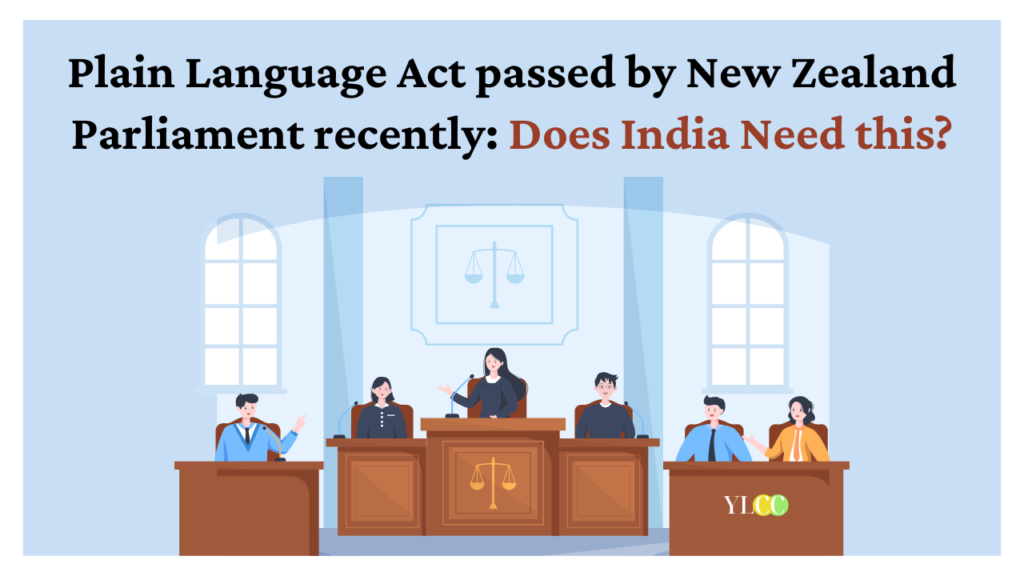
Mind Your Jargon!
Legal jargon can melt your brain. Don’t believe me? See if you can make sense of this,
“New Zealand put the afore bar or embargo on the practice of legalese in a new legislation wherethrough it expressed its expostulation on the aforementioned practice.”
You weren’t able to, were you? This is the kind of language that makes normal people want to rip their hair out. Since we know you couldn’t make out what was written, let us explain,
“New Zealand passed a law that says you can’t use jargon.”
Yes, no one will be allowed to use therein, hither, among other things, hereto, or state “null and void and of no effect whatsoever” when “void” or “null” would suffice. This is good news for citizens of New Zealand and their hair!
THE BILL: HIGHLIGHTS
- Last month, New Zealand passed the Plain Language Act.
- On October 19, 2022, following the conclusion of the final debate and vote on the Bill, the Bill was ultimately approved.
- On October 21, 2022, the document was granted royal assent.
- The Bill’s primary objective is to promote accessibility and inclusivity in all settings.
THE PURPOSE OF THE ACT
- The quality of life for people who have disabilities, speak English as a second language, and have lower levels of education is the primary focus of the law’s primary objective, which is to improve those people’s lives.
- By guaranteeing that all members of the public have access to communications that are unambiguous, inclusive, and simple to understand, the Plain Language Act seeks to increase the efficiency and transparency of public services.
- This way the initiative makes New Zealand into a democracy that is more welcoming to people of all backgrounds by reducing the amount of jargon and other forms of complex language that are used in the country’s bureaucracy.
- The proposed law specifies that “plain language” must be easily understood by the target audience after a single reading.
- “Plain language” is defined by the Act as language that is clear, concise, and organized in a sensible way.
KEY FEATURES OF THE PLAIN LANGUAGE ACT
- The Act makes it necessary to appoint plain language officers and requires the Public Service Commissioner to develop plain language guidance. Additionally, the Act makes it necessary to implement plain language policies.
- In addition to this, it is necessary to set up a reporting structure in order to evaluate the conformity of the officials working for the government.
- According to this Act, a public service agency is required to provide the Public Service Commissioner with an annual report that outlines the degree to which the agency complies with the requirements regarding the utilization of plain language.
- Within twenty business days of receiving the report, the Minister of Public Service must submit a copy to the New Zealand Parliament to show that the government agencies have complied with the law.
IMPORTANCE
- The Bill asserts that access to information that can be understood, provided by governmental organizations, is a fundamental democratic right.
- A level of transparency in the information provided by the government is not merely a want but rather an absolute necessity. For example, clear and easily accessible pandemic instructions from the government’s health ministry are absolutely necessary for the preservation of lives and the health of the general public.
- The discussion regarding the use of plain language in official communications includes a component regarding linguistic equality as well.
- Minorities, migrants, and other marginalized communities have a harder time understanding government documents because these documents are complicated and filled with jargon. This further tips the scales of development in their favor.
- Although the principles of plain language have been around for some time in New Zealand, the legislation that mandates their use is something brand new.
DOES INDIA NEED A PLAIN LANGUAGE ACT?
While countries like New Zealand, Germany, the United Kingdom (the UK), Australia, and Hong Kong have ensured that the value of simple language is taken into consideration while writing legislation, India does not have any such regulations in place.
Arey Kehna Kya Chahte ho?
The use of antiquated terminology in legal documents is nothing new in India. In fact, the Supreme Court has, on multiple occasions, criticized judicial writing that was cloaked in superfluous legalese.
An order issued by the Himachal Pradesh High Court earlier in this year was overturned by a bench of the Supreme Court because it was incomprehensible. They said at the time that “the purpose of judicial writing is not to confuse or confound the reader behind the veneer of complex language.”
This was the fifth time the Supreme Court has said that a ruling from the Himachal Pradesh High Court was confusing and hard to understand.
This is not only a judicial issue, lawmakers have had their share of embarrassing moments as well. For instance, according to PRS Legislative Research, there were 4,130 executive orders issued by states and the Center during the time of the Coronavirus outbreak.
After each order, there were at least two or three clarifications issued, and sometimes explanations to clarify the clarifications were issued, which is nothing but a shame on the communication abilities of our bureaucrats.
So yes, it would be wise for India to follow in their footsteps. If it is impossible for the average individual to comprehend laws, then it is difficult to fault them when they choose to disobey.
CONCLUSION
To ensure that the rule of law, in its broadest meaning, is really prevalent, the Union Government must make concerted efforts to disseminate the law to the general public.
As such, now is the time to rally support for such a movement in India. To ensure that everyone has the opportunity to exercise their rights, combat discrimination, and hold decision-makers responsible, the right to access the law is essential.
YLCC would like to thank Pearl Narang for her valuable input in this article.






